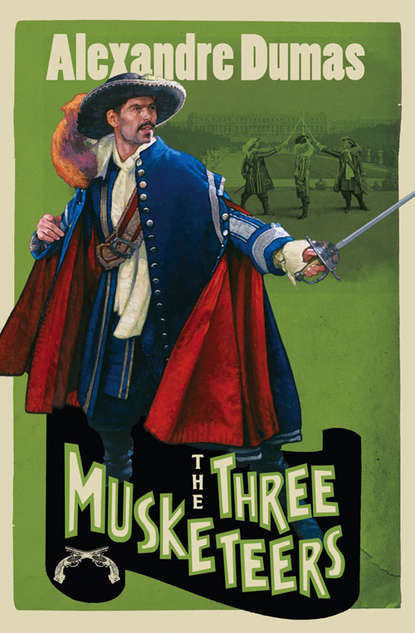По всем вопросам обращайтесь на: info@litportal.ru
(©) 2003-2024.
✖
The Three Musketeers
Автор
Год написания книги
2018
Настройки чтения
Размер шрифта
Высота строк
Поля
“Sir,” answered Aramis, in a melancholy tone, “he is ill, very ill.”
“Ill! very ill, say you? and of what disorder?”
“We fear it is the small-pox,” answered Porthos, anxious to put in a word; “and this would be very distressing, since it would certainly spoil his face.”
“The small-pox! This is a marvellous story you are telling me, Porthos! Ill of small-pox at his age! No, no; but doubtless he is wounded, perhaps killed. Ah! if I were certain of this! Zounds, gentlemen, I do not understand why you haunt such loose places, why you quarrel in the streets, and play with the sword in the crossways; and I do not wish you to afford mirth for the cardinal’s guards, who are brave men, quiet, and skilful, who never throw themselves open to an arrest, and who, moreover, would not allow themselves to be arrested, not they! I am sure they would rather die than be arrested or escape! It is you who fly! who scamper away! A fine thing for the royal musketeers, indeed!”
Porthos and Aramis shook with rage. They could have strangled M. de Treville, had they not perceived that his great affection for them was the foundation of all he said.
As it was, they stamped on the carpet, bit their lips till the blood ran, and grasped the hilts of their swords with all their might.
M. de Treville’s summons for Athos, Porthos, and Aramis had, as we have said, been heard outside the room; and those who remained in the antechamber had concluded, from the sound of his voice, that he was in a towering rage. Ten curious heads, therefore, rested against the tapestry, and grew pale with anger, for their ears, glued to the door, lost not one word of what was said, whilst they rapidly repeated the taunting language of their captain to all who were in the antechamber. In an instant the whole hotel, from the door of the cabinet to the outer gate, was in a state of commotion.
“So! the musketeers of the king allow themselves to be arrested by the guards of the cardinal!” continued M. de Treville, not less excited within than were his soldiers without, but jerking out and mincing his words, and plunging them, as one may say, one by one, like poniards, into the bosoms of his auditors. “So, six of his excellency’s guards arrest six of his majesty’s musketeers! Sangdieu! I have taken my resolve. I will go hence to the Louvre, where I shall tender to the king my resignation as captain of the musketeers, and demand a lieutenancy in the cardinal’s guards; and if I fail in this, mortdieu, I will turn abbé!”
At these words the murmurs without broke out into a regular explosion; nothing but oaths and curses were everywhere heard. “Morbleu!” “Sangdieu!” and “Death to all the devils!” resounded through the hotel. D’Artagnan hastily glanced around the cabinet in search of some tapestry behind which he might hide himself, and failing in this, felt an almost uncontrollable desire to get under the table.
“Well, captain,” said Porthos, almost beside himself, “the truth is, we were six against six, but were unawares set upon, and before we had time to draw our swords, two of our party fell dead, and Athos was so grievously wounded as to be scarcely in better plight. You know him well, captain; twice he endeavoured to rise, and twice he fell back; and yet we did not yield ourselves up. No, we were dragged away by force; but escaped on the road. As for Athos, they believed him dead, so quietly left him on the field of battle, not thinking he was worth carrying away. That is the truth. Zounds! captain, one cannot gain every battle; even the great Pompey lost that of Pharsalia; and Francis, who, I have heard, was as brave as most men, lost the battle of Pavia.”
“And I can assure you that I killed one fellow with his own sword,” said Aramis, “for mine broke at the first parry. Killed or poniarded him, as you please!”
“I did not know these circumstances,” said M. de Treville, in a somewhat milder tone; “from what I now learn, the cardinal must have exaggerated.”
“But I beseech you, sir—” said Aramis, who, seeing his captain more calm, ventured to hazard a request—“I beseech you, sir, do not say that Athos is wounded; he would be in despair if it came to the king’s ears; as the wound is very severe, having, after passing through the shoulder, penetrated the chest, it is not impossible———”
At this moment the door opened, and a noble and beautiful face, but frightfully pale, appeared.
“Athos!” exclaimed both the gentlemen.
“Athos!” repeated M. de Treville himself.
“You inquired for me,” said Athos, to M. de Treville, in a perfectly calm but feeble voice. “My comrades informed me that you commanded my presence, and I hastened to obey you; here I am, sir; what do you require me for?” And with these words the musketeer, perfectly arrayed, and girded as usual, entered the cabinet with a firm step.
M. de Treville, touched to the heart by this proof of endurance, rushed towards him. “I was just going to tell these gentlemen,” added he, “that I forbid my musketeers to expose their lives unnecessarily; for brave men are dear to the king, and his majesty knows that his musketeers are the bravest on the earth. Your hand, Athos!” And without waiting till he responded to this proof of affection, M. de Treville seized his hand, and pressed it with much warmth, and without observing that Athos, notwithstanding his command over himself, uttered a cry of pain, and became even more pale than before, if it were possible.
In spite of the secrecy which had been observed respecting it, the severe wound which Athos had received was well known to his comrades, and his unlooked-for arrival had produced a great sensation amongst them. The door of the cabinet had, since his entrance, remained ajar; and, as two or three heads were, in the warmth of the general feeling, thrust through the opening of the tapestry, a simultaneous burst of applause followed the last words of their captain. M. de Treville would, doubtless, have sternly and instantly checked this infraction of the laws of propriety; but at the moment he suddenly felt the hand of Athos grasp his own, and, on looking at him, perceived that he was fainting. He had rallied all his powers to struggle against his pain during the interview; but he could now no longer sustain it, and fell senseless upon the carpet.
“A surgeon!” cried M. de Treville; “mine—or, rather, the king’s—a surgeon! or my brave Athos will die!” At these exclamations of M. de Treville, every one rushed into the cabinet, and before he could stop them, pressed round the wounded man. But this eagerness would have been useless, had not the surgeon been found in the hotel. Forcing his way through the spectators, he approached Athos, who was still insensible; and as the pressure of the crowd occasioned him much inconvenience, he directed as the first step of all, that the guardsman should be instantly conveyed into an adjoining apartment. M. de Treville immediately opened a door, and pointed out the way to Porthos and Aramis, who bore off their comrade in their arms.
The cabinet of M. de Treville, that place usually deemed sacred, became for the moment an adjunct to the antechamber, and one in which every one discoursed, talked loud, swore, and consigned the cardinal and all his guards to the infernal regions. In a few moments Porthos and Aramis re-entered, having left M. de Treville and the surgeon with the wounded man. At length M. de Treville himself followed, and announced that Athos had recovered his senses; whilst the surgeon declared that there was nothing in his situation to alarm his friends, his weakness being occasioned entirely by the loss of blood.
Upon a signal from M. de Treville, every one now retired except d’Artagnan, who did not abandon his audience, but, with true Gascon tenacity, held his ground. When all the intruders had left the room, and the door was again closed, M. de Treville turned round, and found himself alone with the young man. The event which had just taken place had in some measure disarranged the previous train of his ideas; and he therefore now inquired what this persevering visitor required. D’Artagnan repeated his name; and M. de Treville, recalling the past and present, instantly became aware of his situation.
“Pardon,” said he smiling, “pardon, my dear countryman, but I had entirely forgotten you. What do you want? A captain is merely the father of a family, but burdened with a heavier responsibility than an ordinary parent; for soldiers are great children; but, as I maintain, it is my duty to see that the orders of the king, and more especially those of the cardinal, are carefully executed.”
D’Artagnan could not repress a smile; and this smile satisfied M. de Treville that he was not dealing with a fool. Therefore he came at once to the point, and, at the same time, changed the subject.
“I have loved your father,” said he; “what can I do for his son? Tell me quickly, for my time is not my own.”
“Sir,” said d’Artagnan, “in quitting Tarbes, and coming here, I wished to ask from you, as a memorial of the friendship which you have not forgotten, the uniform of a musketeer; but from what I have seen during these last two hours, I more fully comprehend the extreme importance of the favour, and tremble lest I may not be deemed a fit recipient.”
“It is truly a great favour, young man,” said M. de Treville; “but it cannot be so far above you as you believe, or, at least, seem to believe. However, a decision his majesty has provided for this case; and I regret to inform you, that no one is received among the musketeers who has not passed the ordeal of some campaigns, performed certain brilliant actions, or served for two years in some less favoured regiment than our own.”
D’Artagnan bowed in silence, but at the same time feeling more eager to don the uniform of the musketeers, since that object could only be obtained with great difficulty.
“But,” continued M. de Treville, fixing his piercing look upon his countryman, as if he wished to penetrate the inmost recesses of his heart, “but for the sake of my ancient friend, your father, I wish to do something for you. Young man, we cadets of Bearn are not in general overburdened with wealth, and I fear that matters are not much improved in this respect since I left the province. Your purse, therefore, can scarce be as full as it was.”
D’Artagnan drew himself up with a proud air, which seemed to say, “I ask charity of none.”
“It is well, young man, it is very well; I understand your feelings. I came to Paris myself with only four crowns in my pocket, and I would have fought any one who had dared to dispute my ability to purchase the Louvre.”
D’Artagnan assumed a still prouder air. Thanks to the sale of his horse, he began the world with four crowns more than M. de Treville.
“I should say, therefore, that however large may be the sum you really possess, you ought to preserve it. In the meantime you must perfect yourself in all those accomplishments which become a gentleman, and I will this day write a letter to the director of the Royal Academy, who will receive you tomorrow without any fee. Do not refuse this trifling favour. Gentlemen of the highest rank and wealth often solicit without being able to obtain it, the same gift. You will there learn to ride, to fence, and to dance; you will form a circle in good society; and from time to time you must personally apprise me of your progress, and let me know if I can do anything for you.”
D’Artagnan, ignorant as he was of the manners of high society, felt the coldness of this reception.
“Alas, sir,” said he, “I now deeply feel the want of the letter of introduction which my father gave me for you.”
“I am, in truth, somewhat surprised,” replied M. de Treville, “that you should have undertaken so long a journey without that viaticum, so essential to every Bearnese.”
“I had one, sir, and a good one—thank God!” cried d’Artagnan, “but was perfidiously robbed of it;” and with a degree of warmth and an air of truth which charmed M. de Treville, he recounted his adventure at Meung, accurately describing his unknown adversary.
“It was very strange,” said M. de Treville musingly. “You spoke of me openly, did you?”
“Yes, sir, I certainly committed that imprudence; but such a name as yours served me as a shield on my journey; therefore you can guess if I frequently covered myself with it or no!”
It was an age of flattery, and M. de Treville loved the incense as well as a king or a cardinal. He could not help smiling, therefore, with evident satisfaction; but this smile soon passed away, and returning to the adventure at Meung, he continued—
“Tell me, had not this gentleman a slight scar on the cheek?”
“Yes, as if left by a pistol-ball.”
“Was he not a man of commanding air?”
“Yes.”
“Of a tall figure?”
“Yes.”
“With an olivine complexion?”
“Yes, yes, that is he: but do you know this man, sir? Ah! if I ever meet him—and I will find him, I swear to you, even were he in hell———”
“He attended a woman did he not?” continued M. de Treville.
“At least he departed after he had conversed a moment with the one he had attended.”

















